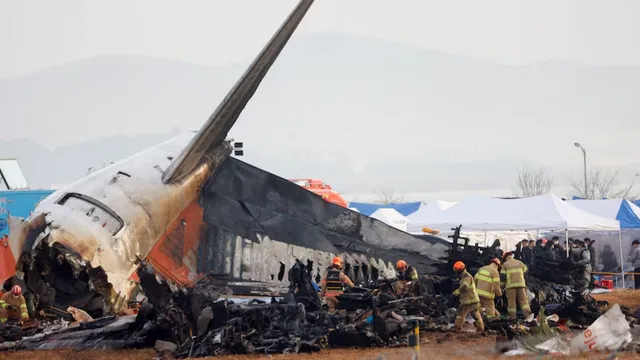- By Supratik Das
- Mon, 21 Jul 2025 01:00 PM (IST)
- Source:JND
Jeju Plane Crash: The ongoing South Korea-led investigation into the fatal Jeju Air crash last December has found “clear evidence” that the pilots mistakenly shut down the less-damaged engine after a bird strike, according to a source cited by Reuters. The source, who spoke with Reuters on background, said cockpit voice recordings, flight computer information, and a physical engine switch found in the wreckage indicate that the flight crew killed the left engine rather than the right engine during emergency procedures. "The investigation team has definitive evidence and backup data, so its conclusion will not alter," the source added. The Aviation and Railway Accident Investigation Board (ARAIB), which is conducting the probe, has not yet made an official announcement regarding the details.
No Engine Defects Discovered Before Crash
Another government official cited by Reuters claimed inspections of the Boeing 737-800's engines revealed no prior defects before the December 29 fatal bird strike and crash at Muan Airport. The plane, which was coming in from Bangkok, veered off the runway while making an emergency belly landing, crashing into an embankment and setting a fire that killed 179 of the 181 occupants. It is the deadliest South Korean air tragedy so far.
Victims’ families were briefed privately over the weekend but objected to the planned public release of the update, saying it appeared to blame the pilots without considering other factors. The union of Jeju Air pilots also protested, claiming that the ARAIB was "misleading the public" by not considering that bird remains were discovered in both engines. The union claimed that investigators need to scientifically establish if the plane was able to land safely on one engine. "Air accidents are multifaceted and more often than not, the result of multiple causes. Until now, no evidence positively establishes pilot error as the sole cause of this tragedy," the union issued a statement.
Focus on Embankment’s Role In Fatal Crash
Experts and relatives' representatives have demanded further examination of the embankment at the airport, which housed navigation equipment and is thought to have made the crash impact and fire even more severe. Lawyers for grieving families called on the investigating agency to explain all probable causes, rather than narrow it down to pilot behavior. Jeju Air, on the other hand, maintains it is cooperating fully with the investigation and waits for the final report. Plane maker Boeing and engine producer CFM International refused to comment, directing all questions to South Korea's investigation board.
ALSO READ: What Are Fuel Switches? How A Simple Cockpit Lever Led To Air India Boeing 787 Fatal Crash
An initial report published in January confirmed that duck remains were discovered in both engines but did not go into detail about the damage. According to international regulations, a final report is normally published within 12 months of an accident.
With inputs from agency.
